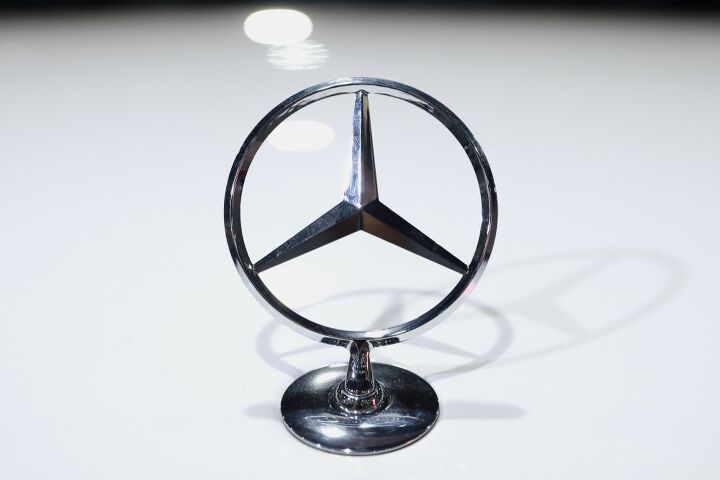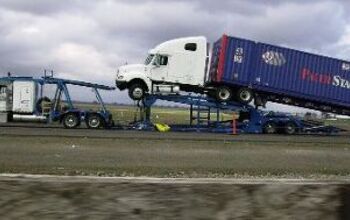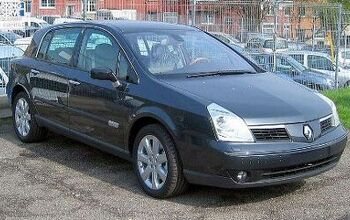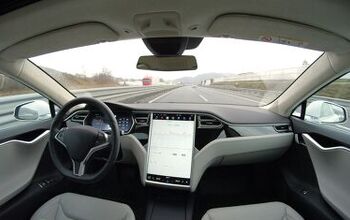What Ever Happened to Mercedes' Dieselgate?

After Volkswagen admitted to equipping some of its diesel-powered autos with illegal software designed to circumvent emissions testing in 2015, every automaker on the planet fell under enhanced scrutiny. By 2016, U.S. regulators were checking on Mercedes-parent Daimler to see if there were any pollutant-related shenanigans taking place behind the scenes. Germany followed suit shortly thereafter, launching its own investigation.
However, with no local updates on the matter, it was presumed Daimler was in the clear — except Germany did find evidence of corporate misdeeds and the company recalled 3 million vehicles in 2017. At the time, we figured the situation would swiftly bleed over into the United States and help wrap things up. But it hasn’t yet and The Detroit News took time this month to ponder what’s taking federal regulators so long.
Busting VW took the government about a year and a half, while the Daimler investigation has been ongoing for double that. The last major breakthrough happened over a year ago, with regulators suggesting Mercedes’ diesels may have been equipped with illegal software. An engine management function called Slipguard apparently recognized whether the car was undergoing testing procedures while another, called Bit 15, halted emissions cleaning after roughly 16 miles of driving. But we haven’t heard much since.
“Three years seems unusual,” John German, a former EPA official and a senior fellow at the International Council on Clean Transportation (the group that commissioned the study that uncovered Volkswagen cheating).
From The Detroit News:
In April, consumer advocacy and environmental groups sent a letter to Congress asking that the investigation be expedited.
“It is past time for greater urgency and action from regulators and Congress on the allegations against Mercedes,” the advocates wrote. “Owners and lessees of Mercedes diesel vehicles have been left without answers or recourse while the illegally polluting vehicles remain on U.S. roads.”
American regulators’ inquiry into Daimler began in 2016 when the Department of Justice asked the company to conduct an internal investigation into its diesel exhaust emissions. Since then, the automaker has stopped selling diesel-powered passenger cars in the U.S.
“To me, that suggests that they had a problem and they’re trying to limit their exposure to that problem,” German said.
Back in the initial stages of the investigation, Daimler claimed that the accusations against it were preposterous and that it would fight back using all legal means at its disposal. It also expressed its distaste for the frequent raids conducted by German prosecutors. While automotive manufacturers found themselves subjected to a bit of a diesel emissions witch hunt following VW’s crisis, some industry analysts assumed it would only be a matter of time before investigators would uncover another major scandal (there were plenty of lesser ones). They appeared to be correct, at least in Europe.
Daimler said it has continued cooperating with U.S. authorities/regulators — neither of which have anything to say on the matter. Mercedes-Benz is also in the midst of a class-action lawsuit over claims that it knowingly sold cars to U.S. customers that polluted more than the company let on. And there’s been added attention stemming from last months’ news that the company is being forced to recall an additional 60,000 Mercedes-Benz models built between 2012 and 2015 in Germany.
It might just be a matter of time before U.S. regulators are forced to say something, even if that something is inconclusive.
[Image: Pixfly/Shutterstock]

A staunch consumer advocate tracking industry trends and regulation. Before joining TTAC, Matt spent a decade working for marketing and research firms based in NYC. Clients included several of the world’s largest automakers, global tire brands, and aftermarket part suppliers. Dissatisfied with the corporate world and resentful of having to wear suits everyday, he pivoted to writing about cars. Since then, that man has become an ardent supporter of the right-to-repair movement, been interviewed on the auto industry by national radio broadcasts, driven more rental cars than anyone ever should, participated in amateur rallying events, and received the requisite minimum training as sanctioned by the SCCA. Handy with a wrench, Matt grew up surrounded by Detroit auto workers and managed to get a pizza delivery job before he was legally eligible. He later found himself driving box trucks through Manhattan, guaranteeing future sympathy for actual truckers. He continues to conduct research pertaining to the automotive sector as an independent contractor and has since moved back to his native Michigan, closer to where the cars are born. A contrarian, Matt claims to prefer understeer — stating that front and all-wheel drive vehicles cater best to his driving style.
More by Matt Posky
Latest Car Reviews
Read moreLatest Product Reviews
Read moreRecent Comments
- Jeff One less option will be available for an affordable midsize sedan. Not much can be done about GM discontinuing the Malibu. GM, Ford, and Stellantis have been discontinuing cars for the most part to focus on pickups, crossovers, and suvs. Many buyers that don't want trucks or truck like vehicles have moved onto Japanese and South Korean brands. Meanwhile large pickups and suvs continue to pile up on dealer lots with some dealers still adding market adjustments to the stickers. Even Toyota dealers have growing inventories of Tundras and Tacomas.
- Lorenzo This car would have sold better if there was a kit to put fiberglass toast slices on the roof.
- Lorenzo The Malibu is close to what the 1955 Bel Air was, but 6 inches shorter in height, and 3 inches shorter in wheelbase, the former making it much more difficult to get into or out of. Grandma has to sit in front (groan) and she'll still have trouble getting in and out.The '55s had long options lists, but didn't include a 91 cubic inch four with a turbo, or a continuously variable transmission. Metal and decent fabric were replaced by cheap plastic too. The 1955 price was $1765 base, or $20,600 adjusted for inflation, but could be optioned up to $3,000 +/-, or $36,000, so in the same ballpark.The fuel economy, handling, and reliability are improved, but that's about it. Other than the fact that it means one fewer sedan available, there's no reason to be sorry it's being discontinued. Put the 1955 body on it and it'll sell like hotcakes, though.
- Calrson Fan We are already seeing multiple manufacturers steering away from EVs to Hybrids & PHEVs. Suspect the market will follow. Battery tech isn't anywhere close to where it needs to be for EV's to replace ICE's. Neither is the electrical grid or charging infrastructure. PHEV's still have the drawback that if you can't charge at home your not a potential customer. I've heard stories of people with Volts that never charge them but that's a unique kind of stupidity. If you can't or don't want to charge your PHEV then just get a hybrid.
- AZFelix The last time I missed the Malibu was when one swerved into my lane and I had to brake hard to avoid a collision. 1 out of 5⭐️. Do not recommend.


































Comments
Join the conversation
In Europe, after news of the Volkswagen Diesel Scandal broke, all European, Japanese, Korean etc. manufacturers were investigated, and to nobody’s surprise, most of their gasoline and Diesel cars emitted more pollutants in the real world than under controlled laboratory settings. The dirtiest diesels came from Fiat and Renault, if memory serves me right.
All cars will excede allowable emissions levels during some parts of their drive cycle. This is allowable in the regulations. When you floor it, do you think the emissions are in the normally allowable limit? It can't happen during the whole drive cycle though. When I was a Mercedes tech, those diesels were using AdBlue (DEF) like crazy. We were putting in more than 20liters of the stuff every service. NOx sensors, AdBlue pumps and injectors were constantly failing. I can guarantee you those systems were not being defeated.